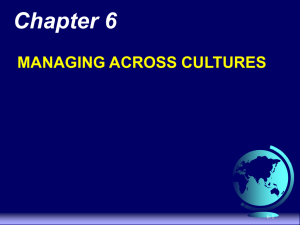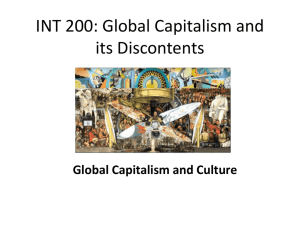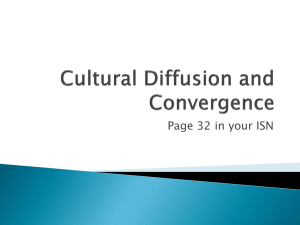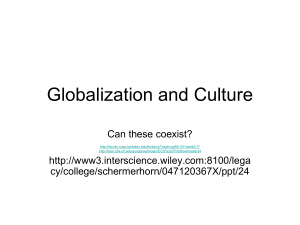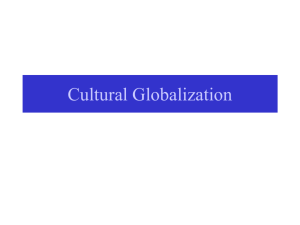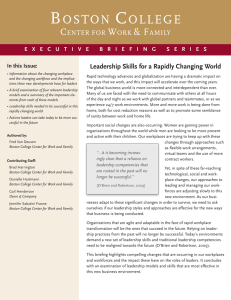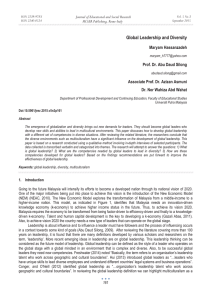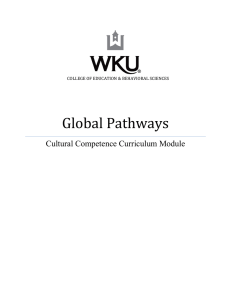GlobalizationIntro
advertisement
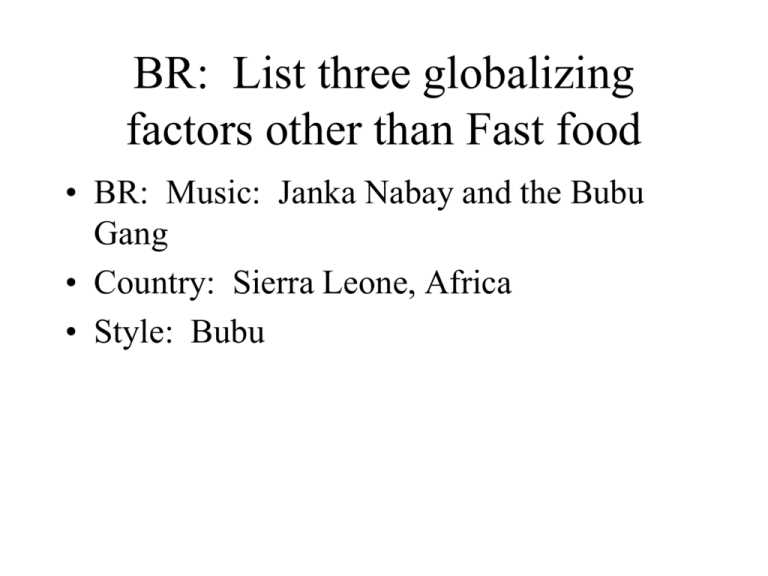
BR: List three globalizing factors other than Fast food • BR: Music: Janka Nabay and the Bubu Gang • Country: Sierra Leone, Africa • Style: Bubu Globalization What is Globalization? Global industrialism or globalization is a process of forging international political, economic, religious, and socio-cultural interconnections 7-11 Beijing KFC Kuwait What doesn’t Fit? Global Culture: Homogenization Technology (Internet, TV, cell phones etc.) is sweeping away cultural boundaries creating the possibility and even the likelihood of a global culture. Global entertainment companies shape the perceptions, values, and dreams of people, everywhere. This spread of values, norms, and culture tends to promote Western ideals of capitalism and consumerism. Resulting in the disappearance of local cultures, traditions, and identities replaced by a single commodity/ single identity world – the Westernization of culture Ladies only line Saudi Arabia Asymmetry in Power Relations and Flows Coca-colonization: Coke, McDonald’s, Levi’s, MTV, Disney, computer games, American (or American style) TV shows, look-alike shopping malls with look-alike goods the meaning of good, appropriate, success changes Banana Republicanization Move from the dominant to the weaker Big Bird does China like to teach the world to sing Globalism - a euphemism for western cultural imperialism? Russia Israel Japan India Golden Arches in Yangshou, China Global Culture as a Source of Universality Globalization is assumed to erase differences among human societies and create a universal culture in which particular characteristics of national and local cultures are no longer relevant. The Colonel looms large in Guelin, China Mr. Softee in Hong Kong On the main street of Chennai, Tamil Nadu, © Dick Waghorne 250 million Chinese have learned English as a second language Culture becomes more homogeneous - Not in the sense that all cultures are incorporated equally, but biased towards American culture and those presented in English Global Capitalist Monoculture Incorporation of all national cultures into the global capitalist economic system is creating a universal culture of capitalism. Penetration of multinational companies into national cultures creates not only a uniform process of production and its associated forms of deregulation, but uniformity of consumer tastes, choices and habits. Tokyo Standardization The overwhelming dominance of multinational companies in the production of cultural goods creates a “convergence effect”. From clothes to food to music to film and television to architecture, we encounter similar styles, brands and tastes anywhere in the world. Will local cultures inevitably fall victim to this global consumer culture? Will English eradicate all other languages? Will consumer values overwhelm peoples’ sense of community and social solidarity? Will a common culture lead the way to greater shared values and political unity? Or will cultures select elements to incorporate Korea McDonaldization “ the process by which a society takes on the characteristics of a fast-food restaurant” (1) efficiency: ”fast”, method of production scientifically proven (2) predictability: ”a world of no surprise” – standard menu, taste, décor, service (3) calculability: quantity rather than quality (4) Control: standardized employees, non-human technology McDonald’s /Hong Kong (1) Standardization: food, interior design, layout etc. (2) Initially presented itself as uncompromising American food - no Chinese name at first - transliteration later - no Chinese food (3) Standard of cleanliness: clean washrooms in restaurants (4) Customer discipline: line up for food (5) Idea of a regular meal: (a) exotic to ordinary; (b) snacks versus meals [customers: middle-class, like exotic American culture all ages, all social classes, look for a simple meal] Global Culture? Identity has intense emotional ties Cultural attachment is bound in tradition Mass marketing & pop culture is no threat! No common pool of memories No common global way of thinking Blurs boundaries Thailand Glocalization globalization + localization Nova Scotia, Canada Globalization Issues Poverty: Enhanced or Diminished? Child Labor: Increased or Reduced? Women: Harmed of Helped? Democracy at Bay? Culture Imperiled or Enriched? Wages and Labor Standards at Stake? Environment in Peril? Corporations: Predatory or Beneficial?
